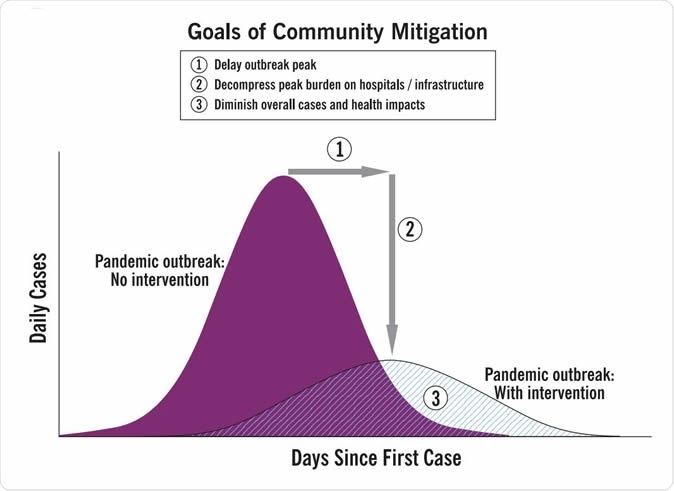The coronavirus disease (COVID-19) is a contagious disease caused by a novel coronavirus, akin to previous infections such as severe acute respiratory syndrome (SARS) in 2002 and the Middle East Respiratory Syndrome coronavirus disease (MERS-CoV) in 2012.
The causative agent of COVID-19, the severe acute respiratory syndrome coronavirus 2 (SARS-CoV-2), causes a respiratory illness with pneumonia-like symptoms. Those who develop a severe illness may have acute respiratory distress syndrome (ARDS) and multiorgan failure.
SARS-CoV-2 has affected several countries across the globe, prompting governments to impose social distancing measures to slow the spread of infection.
.jpg)
Image Credit: EamesBot / Shutterstock
What is social distancing?
Social distancing or physical distancing is a set of non-pharmaceutical methods or interventions to prevent the spread of an infectious disease. It involves maintaining a physical distance between people and decreasing the number of times people meet each other.
In the current COVID-19 pandemic, public health officials in many countries have applied social distancing measures to help reduce the rapid spread of the coronavirus. When social distancing is combined with heightened personal hygiene, community-acquired infections decrease. Further, these measures help protect vulnerable populations against the deadly disease. It also helps reduce the impact of the pandemic on essential and life-saving health services.
Social distancing is a part of a method called "flattening the curve," which involves preventing the sudden spike of coronavirus cases in communities and countries affected by the virus. Flattening the curve refers to community isolation measures to keep the number of daily cases at a manageable level to prevent healthcare and medical services and resources from being overwhelmed.

Image Credit: CDC
How to implement social distancing?
To implement social distancing, health officials and governments have canceled events, cruises, festivals, gatherings, weddings, and parties. These measures help stop or slow down the spread of the disease, allowing health care systems to more readily provide care for patients over time.
In some instances, workplaces and schools may also be shut down. In many countries affected by the novel coronavirus, companies are advised to provide work from home schemes for their employees.
Why is social distancing important?
In previous pandemics and outbreaks, health experts have noted that disease spread often followed large crowds and public gatherings, such as festivals and conferences. Further to that, the highest infection rates were often seen in school children, since they are regularly exposed to more people.
Coronavirus: The importance of social distancing explained | ABC News
There is evidence from previous pandemics, such as the 1918 flu pandemic, and the 2014 Ebola outbreak, that social distancing can effectively limit the spread of infectious diseases. Since the novel coronavirus can be transmitted by droplets from the noses and mouths of infected people when they cough or sneeze, staying away from other people or avoiding staying in close distance with infected people when help reduce the risk of infection.
In the novel coronavirus pandemic, health experts recommend that social distancing measures can help reduce the spread of the virus. For instance, in Wuhan City in China, where the virus first emerged, the lockdown and social distancing measures helped reduce infection rates and ultimately 'flatten the curve.' Many countries have followed this step, implementing social distancing measures early, while others had a late implementation, leading to higher infection rates.
The World Health Organization (WHO) recommends social distancing as maintaining at least 1 meter or 3 feet distance between oneself and anyone else. Also, it advises those who have fever, cough, or difficulty breathing to seek medical advice. People should also stay home when they feel unwell to prevent others from contracting the infection.
In theory, the steps are simple to curb this global pandemic. It is crucial to understand why people are asked or required to self-quarantine, self-isolate, and practice social distancing. If health officials request people to stay in their homes, everyone should abide. When a person disobeys the precautions and tests positive for COVID-19, there is a high chance they can transmit the virus to other people.